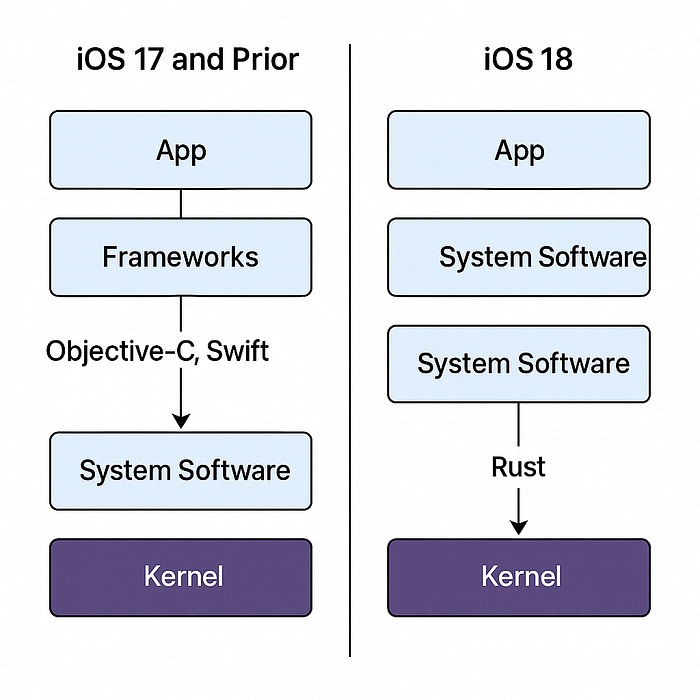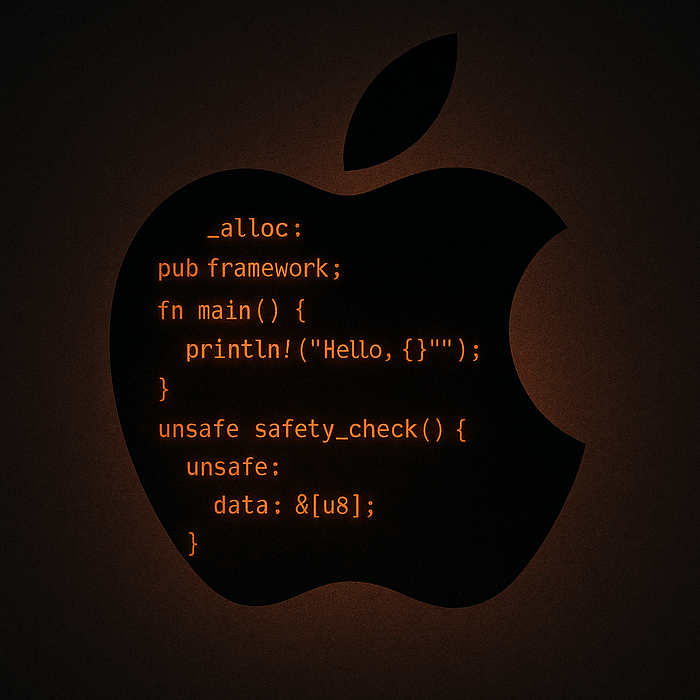Apple is pulling a Thanos snap on iOS, and most devs haven't even noticed yet. Quietly, behind the scenes, parts of iOS are being rewritten not in Swift, not in Objective-C, but in a language that half the community still jokes looks like ASCII art spilled on the keyboard.
Yep. While you're fighting Xcode crashes at 2 a.m. or trying to convince your app to stop randomly yeeting EXC_BAD_ACCESS errors, Apple engineers are rewriting the very code under your feet. It's not a rumor either job listings, leaked commits, and community breadcrumbs point to Apple sliding Rust into the iOS ecosystem. And if you've been around long enough, you know Apple doesn't "experiment" casually.
Why does this matter? Because Apple moving from C/Obj-C underpinnings toward memory-safe, concurrency-friendly systems languages means your apps (and the entire iOS stack) might run faster, crash less, and maybe even stop making you question your career choices.
TLDR: Apple is rewriting key parts of iOS in Rust-like languages for safety and performance. This doesn't kill Swift, but it does mean the foundation under Swift is shifting. Think fewer crashes, better security, and maybe the start of a Rust-shaped future for iOS developers.
The big reveal
So what exactly is Apple doing? In true Cupertino fashion, they haven't put out a flashy press release or keynote about it. Instead, they've been sliding changes into job postings, developer docs, and if you squint at the right repos commits that point toward something big: iOS internals are being rewritten in a Rust-like systems language.
This isn't about apps you build in Xcode or the SwiftUI buttons you argue about on Twitter. We're talking about the guts of iOS: memory management layers, security-critical frameworks, and those low-level OS modules that you only hear about when they break and take half your app with them.
For example, Apple job listings in the last two years have explicitly mentioned Rust experience for systems engineers. Not Swift. Not "C++ wizardry." Rust. That's like Nintendo posting for a new Zelda dev and asking for Unreal Engine skills you know they're serious about the shift.
And it's not hard to guess why. Rust offers memory safety, concurrency without black magic, and performance that makes C devs nod in respect. For a company that's been patching buffer overflows since the iPod days, it's basically free insurance against another "FaceTime bug lets strangers listen to you" PR disaster.
The best analogy? Imagine Apple swapping the engines out of an airplane while it's still in flight. Passengers (that's us, iOS developers) keep sipping the complimentary Sprite and building apps, while under the hood, the entire propulsion system is being replaced with something faster, safer, and way harder to crash.
This isn't a minor update it's a tectonic shift. And it's happening quietly, because Apple knows the moment they confirm it, Reddit, Hacker News, and every dev Discord will explode.
Why Swift wasn't enough
When Swift dropped back in 2014, it felt like Apple was finally giving developers a modern weapon instead of a rusty dagger. Goodbye to Objective-C's square brackets everywhere, hello to cleaner syntax, optionals, and type safety that didn't require sacrificing a goat every time you allocated memory. For a while, it really felt like this is it the future of iOS and macOS dev.
But here's the reality check: Swift isn't a systems language. It rides on top of decades of C and Objective-C foundations. Your shiny SwiftUI view hierarchy? Still leaning on old-school Cocoa frameworks built in C. The Swift compiler might keep you from tripping over null pointers, but it doesn't magically erase the fact that under the hood, you're still dealing with ancient code that's closer to duct tape than titanium.
And memory safety? Better, but not bulletproof. Swift can prevent the dumbest footguns, but when it interoperates with legacy C APIs, you're right back in EXC_BAD_ACCESS land. Every iOS dev I know has stared at an "unexpectedly found nil" runtime crash and thought, why does this still happen in 2025?
Concurrency is another sore spot. Swift's async/await sugar is nice, but compared to Rust's borrow checker and fearless concurrency model, it feels like a bandaid over a bullet wound.
Apple clearly realized Swift can't be the silver bullet for everything. It's great for app-level work, but when you're patching kernels, writing drivers, or dealing with cryptography, you don't want "mostly safe." You want ironclad guarantees.
So if Swift was the "nice, modern, developer-friendly" layer, Rust is turning into the armor plating underneath it. Apple didn't fail with Swift they just learned it wasn't enough to secure the foundation forever.

The rise of Rust in Big Tech
Rust used to be that quirky language you'd hear about from your one hipster friend who also uses Arch Linux and swears by tiling window managers. Fast forward a decade, and suddenly every Big Tech giant is sliding Rust into their stack like it's the secret sauce they've been missing.
Microsoft? They're using Rust in the Windows kernel for new security-critical components. Google? Shipped Rust support in Android's low-level layers because C++ was basically a never-ending memory leak party. Amazon? AWS Firecracker yes, the same microVM tech powering Lambda is written in Rust. Even Meta jumped in, pushing Rust adoption for backend services and open-sourcing internal crates.
The pattern is clear: if you're running at global scale, where one bug can cost millions or become front-page news, C and C++ start to look like ticking time bombs. Rust doesn't make the bombs disappear, but it gives you a compiler that screams at you until you defuse them properly.
And Apple? They've been oddly quiet. While everyone else was writing blog posts and hyping their Rust adoption on Hacker News, Apple stayed in stealth mode. Which, let's be honest, is very on-brand. They'd rather silently roll it into iOS and macOS, then casually drop a "by the way, we rewrote half of Darwin in Rust" at WWDC like it's no big deal.
So no, Apple isn't just experimenting. They're late to the public Rust party, but if history is any guide, they'll show up, flip the table, and redefine the conversation just like they did with ARM chips while Intel was still fumbling with thermal paste.
What it means for iOS devs
Okay, so Apple is quietly swapping out the engine mid-flight. But what does that mean for us the devs who are just trying to get our apps approved without another App Store rejection email at 2 a.m.?
Short term? Honestly, not much. You're not going to fire up Xcode tomorrow and suddenly find a "New Project in Rust" template sitting next to SwiftUI. Your UIKit calls still work, Swift still compiles, and your app will keep crashing for the same dumb logic bugs you wrote yourself (sorry, compiler can't fix you).
Long term though? This is where it gets spicy. If Apple's rewriting the foundations in Rust, you're looking at:
- Safer frameworks → fewer random "unexpectedly found nil" runtime errors.
- Better performance → Rust's low-level efficiency might make your scrolling lists feel smoother without you touching a line of code.
- More secure OS → less chance of some FaceTime-style "strangers can hear you breathing" zero-day.
And here's the wild card: if Apple ever exposes Rust APIs, even partially, it could open the door for a whole new wave of iOS devs who've never touched Swift but love systems programming. Imagine a future where part of your app logic can live in safe, fast Rust while your UI stays in Swift.
Mini-story: I once spent two weeks chasing a UIKit bug that turned out to be an old Objective-C memory leak hiding in the shadows. If Apple rewrites that framework in Rust, the bug doesn't just get patched it ceases to exist. That's the level of invisible magic we're talking about.
For us, the day-to-day grind won't change right away. But the ground beneath Swift is shifting, and if you don't notice, you might wake up one WWDC to realize you're standing on Rust.

My take
Apple's move feels like them quietly admitting what a lot of us already suspected: Swift was never the full endgame. Don't get me wrong I actually like Swift. It's readable, fast enough, and way better than juggling square brackets and manual retain/release ceremonies in Objective-C. But when you're patching kernels or securing crypto libraries, Swift is more like the friendly UI layer on top of a much scarier machine.
For developers, this shift is mostly a win. More stability means fewer late-night crashes that make you question why you didn't just become a barista instead. Better security means fewer embarrassing headlines about iOS bugs that let people eavesdrop on your FaceTime call. And honestly? If Apple is using Rust to harden the foundation, it's the best kind of change the kind that makes your life easier without demanding a rewrite of your entire codebase.
That said, I'm not wearing rose-colored glasses here. There's a real risk of ecosystem fragmentation. If Apple starts mixing Rust, Swift, and whatever legacy Obj-C glue still exists, the stack could feel more like a Jenga tower than a clean, unified language strategy. And if they do expose Rust APIs one day, you can bet the learning curve for newcomers is going to spike.
It's kind of like Apple told us Swift was the Tesla the shiny, modern future. Then halfway through the drive, they quietly swapped in a Rust diesel engine under the hood. It still goes faster, but you can't shake the feeling the story changed mid-ride.
What's next
If history tells us anything, Apple doesn't half-commit. Once they pick a direction, they go all-in just ask Intel how that transition to Apple Silicon went. So if they're sprinkling Rust into iOS internals today, don't be surprised if by iOS 20 the foundation is fully Rust-powered.
What does that look like? For starters, more Swift–Rust interop. Apple won't yank Swift away it's too embedded in the ecosystem but they might quietly expand the toolchain so that lower-level frameworks are rewritten in Rust while Swift stays the "front-facing" dev experience. Think of Swift as the UI sugar layer, while Rust does the dirty work under the hood.
There's also the bigger industry context. Linux already merged Rust into the kernel. Microsoft is pushing it into Windows. Even browsers (Firefox with Servo, Chrome experiments) have flirted with Rust to tackle performance and memory safety. Apple's usually not first, but when they show up, they force the standard.
So here's my bet: WWDC in a year or two, some engineer walks on stage and casually drops: "UIKit has been reengineered with Rust for improved reliability." The crowd claps politely, but every dev in the room knows the ground just shifted.
The forward-looking question isn't if Rust becomes part of the iOS dev storyit's when Apple decides we're ready to hear about it. Until then, the best move for us? Keep building in Swift, but maybe dust off that Rust book on your shelf. You'll thank yourself later.
Conclusion
At the end of the day, Apple rewriting iOS internals in Rust (or Rust-like systems languages) isn't a betrayal of Swift it's an evolution. Swift was never meant to be the language that secured kernels or managed memory at the lowest levels. It was the tool to make developers more productive and apps more expressive. And it's done that well.
But if you zoom out, the writing's on the wall. Swift may remain the pretty UI layer, but the real heavy lifting underneath is shifting toward Rust. That might sting for die-hard Swift evangelists, but honestly? It's good for us. Fewer crashes, fewer zero-day exploits, and less time wasted hunting phantom bugs buried in Objective-C glue code.
Here's the slightly controversial take: in five years, Swift could be the JavaScript of Apple's ecosystem great for the front-end, but not what powers the core. Rust (or a Rust-inspired cousin) will be the foundation. And when that happens, you'll either be ready, or you'll be googling "Rust tutorial" at 3 a.m. while your CI/CD pipeline fails.
So maybe the best move right now isn't panic it's curiosity. Because the ground beneath iOS development is shifting, and whether you like it or not, Rust is part of your future.

